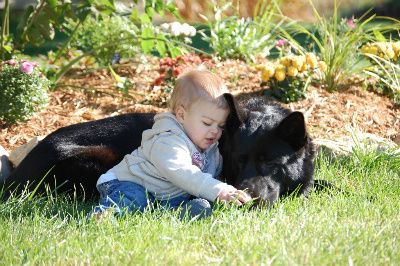Hi all. I have heard of a company that puts together a complete raw frozen food that one defrosts and then just serves. I must admit while i enjoy feeding a variety to my dogs if this has all they need then it would help in cost and time..Anyone see a down side to feeding a complete raw food? I thibk i will still top it up with RMb like turkey necks.
Does anyone see any issues with thier food content? if so please advise me. Many thanks.
MOISTURE: 61.9%
Sources: Natural meat juices (drinking water cannot substitute meat juices for all functions, egg it does not reach the cells).
Function: Keeping up humidity and body temperature; secretion of waste matter, it contains the easiest absorbable iron (tap water contains more iron, but it cannot be absorbed).
Crude protein: 11.20%
Sources: ox muscle meat, ox heart, ox liver ox lung, ox kidneys, third stomach fourth stomach, paunch, chicken
Function: Nutrients for the body : enzymes, cells, hormones.
Crude /at 10.60%
Sources: ox fat, chicken fat, sunflower oil,
wheat-germ oil, fish liver-oil Function: Source of energy nutrient taste.
Crude cellulose: 1.2%
Sources: Indigestible rests of maize, wheat,
bran Function: Adaptation of the rate of intestine
transit.
Ash: 2.1%
Rest Carbohydrates: 13%
Sources: Maize, wheat, bran Function: Nutrients.
MINERALS
Calcium 0.47% Structuring of the skeleton Diy matter 1.09%
Potassium 0.21% Growth ; prevents restlessness and bad nervous development.
Sodium 0.42% Necessary for the production of digestive acids in the stomach.
Magnesium 275mg/kg Necessary for bones and tissue; for stronger JOINTS in puppies.
Manganese 14mg/kg Structuring of bones and production of enzymes; fertility and optimum effect of the vitamin B Complex and of Vitamin C. Iron 31 mg/kg.Absorption of oxygen; prevents anaemia, weakness and fatigue.
Cobalt 0.8mg/kg Blood cell production and optimum effect of Vitamin B12
Copper 5.8mg/kg Blood cell production; allows iron absorption, necessary for pigment.
Zinc 65mg/kg Skin, nails, appetite; optimum functioning of the kidneys muscular strength; necessary for the synthesis of protein.
Phosphorus 0.46% Bones and the functioning of the Dry matter 1.06% Vitamin B Complex.
Selenium 0.12mg/kg Is, together with Vitamin E, necessary for fertility.
Iodine 0.65mg/kg Necessary for all vital processes, METABOLISM and use of oxygen.
DUCK EXCELLENT 2.340,-K/Cal / kilo
VITAMINS
Vitamin A, 8000 iu/kg
Is only found in animal material.
Sources: Liver, fish liver oil.
Function: Growth and development resistance to infections; prevents night-blindness;
Skin, hair and bones.
Vitamin Bl, 12 mg/kg
Sources: Wheat, bran, liver, brewer's yeast. Function: Digestion, growth, nervous and cardiac functions.
Vitamin 62, 8 mg/kg
Sources; Liver, kidney
Function: Production of energy out of fat and protein; growth and development.
Vitamin B3, 33 mg/kg
Sources: Meat, wheat, bran, lung, kidney, liver, heart, chicken, acid brewer's yeast.
Function: Optimum functioning of the kidneys; synthesis of antibodies; energy metabolism.
Vitamin B5, 158 mg/kg
Sources: Lung, liver, kidney, muscle meats,
wheat, brewer's yeast Function: Digestion; conversion of energy into
protein, fats and carbohydrates; blood
pressure.
Vitamin B6, 33 mg/kg
Sources: Beef, heart, liver, kidney, lung, brewer's yeast, bran.
Function: Processing of protein and fat; prevents nervous and skin diseases; Supports metabolism of several minerals.
Vitamin B9, 12 mg/kg
Sources: Muscle meats, liver, kidney, wheat, brewer's yeast.
Function: Healthy skin, formation of antibodies; formation of blood platelets, muscles and nerves; milk production.
Vitamin B12, O.lOmg/kg
Sources: Beef, liver, kidney
Function: Provides appetite and more energy. Prevents anaemia, promotes normal-growth; supports normal functioning of the nervous system.
Vitamin C, 23mg/kg
Sources: The dog usually produces this itself. However, we do add Vitamin C to the food, because some animals consume more than they can produce.
Function: Bones, cartilage and skin; fertility; prevention of infections and mucous bleedings.
Vitamin D3, 945 iu/kg
Sources: Fish liver oil, sunlight. Function: Prevention of rachitis; transportation of phosphorus and calcium.
Vitamin E, 15mg/kg
Sources: Wheat-germ oil, sunflower oil, fish liver oil. Function: Production of red blood cells; promotes Vitamin A and K intake.
Vitamin K, 1.08 mg/kg
Sources: Maize, chicken, meat.
Function: Important for coagulation of the blood.
Biotin, 0.074 mg/kg
Sources: Ox liver, kidney, brewer's yeast. Function: Fur and fat-metabolism; prevents
eczema, fatigue and supports the
synthesis of Vitamin C.
** from
http://www.k9consultants.co.uk/duck-analysis.html **
Edited by Connie Sutherland (07/23/2009 03:03 PM)
Edit reason: include source of text
 Previous Topic
Previous Topic Index
Index Next Topic
Next Topic











 Top
Top




